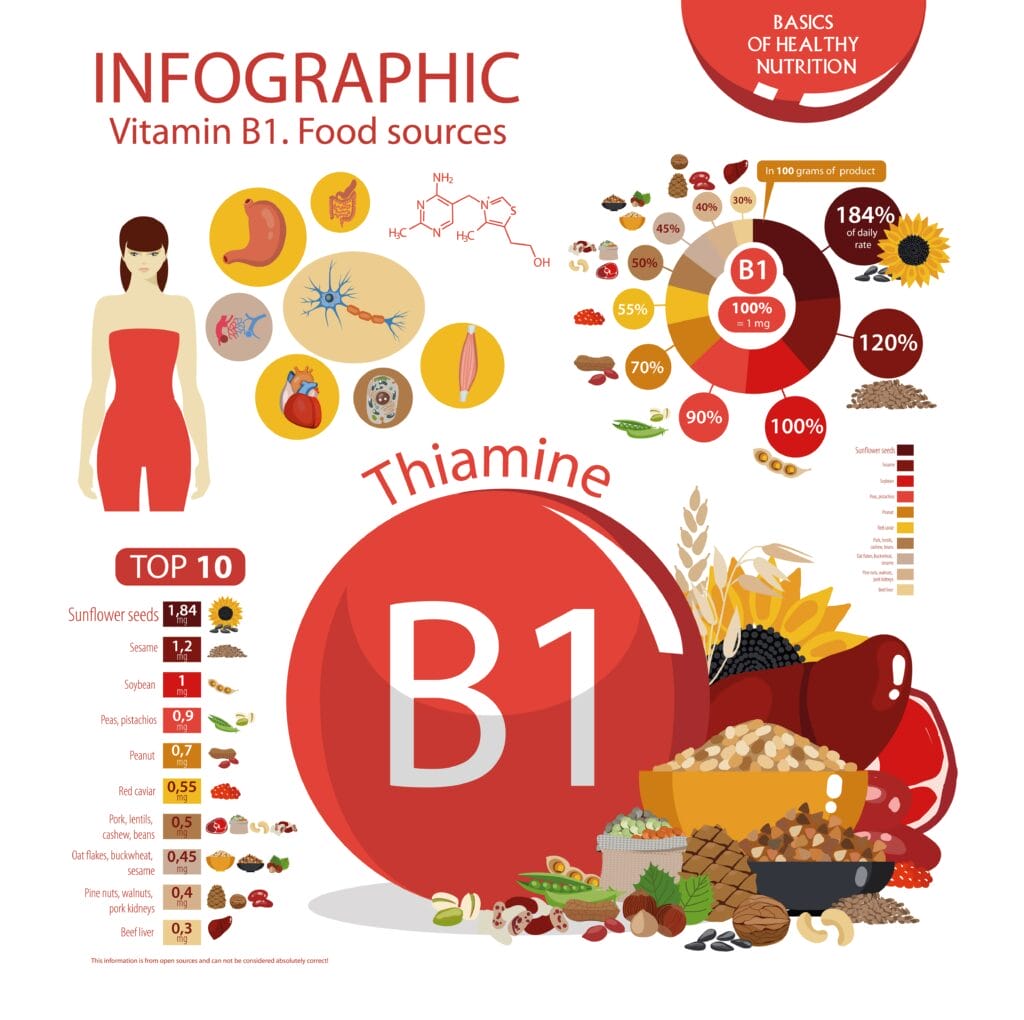Prebiotic/Probiotic, Vitamins / By Simon
Understanding how the body works and what we need to put into it on a daily basis can be confusing at times, mainly because there are so many factors to consider, such as vitamins, minerals, probiotics, nutritional information from food, and more. Both vitamins and probiotics help the body function and many people will wish to take both. But can you mix vitamins and probiotics?
As a general rule you can mix probiotics and vitamins together. The vitamins will not damage the beneficial bacteria in the probiotics. Also, the bacteria in the probiotics will not absorb a significant amount of the vitamins and reduce their dose.
So you can take probiotics and vitamins together, and taking them 30 minutes before a meal with omega-3 (fish) oil or chocolate may make their absorption even better.
To understand what affect they have no each other and the benefits of taking them together, we need to consider what vitamins and probiotics are and their role in the body.
What are probiotics?

Probiotics are live bacteria for which there is evidence of health benefits through restoring or improving gut flora (microorganisms found in a human’s digestive tract) when consumed. We all have trillions of microorganisms in our colon, our gut microbiome. The gut microbiome has been linked to many illnesses such as Parkinson’s disease, anxiety, depression, heart disease and possibly even aging.
In contrast, prebiotic supplements are compounds, usually indigestible starches, that when taken pass through the gastrointestinal tract and reach the bacteria in the colon. Here the beneficial bacteria have the correct enzymes to break the indigestible starch down, use it to provide them with food and beneficial molecules for us.
Probiotics essentially increase the number of healthy organisms in the gut and reduce the number of harmful bacteria.
Classifying probiotics
The most common bacterial strains included in probiotic supplements-
- Lactobacillus acidophilus
- Lactobacillus Plantarum,
- Lactobacillus Casei,
- Lactobacillus Rhamnosus
- Bifidobacterium animalis
Due to them being the most common probiotics, they are also the most studied, and they are namely Bifidobacteria and Lactobacillus.
Bifidobacteria is a type of probiotic found and put into foodstuff and supplements. It can support the immune system, limit the growth of bacteria in the intestinal tract, and it may also help break down lactose into nutrients.
Lactobacillus is a probiotic species that helps explicitly to breakdown lactose, producing lactic acid. Furthermore, Lactobacillus does help the body absorb minerals easier, and this probiotic is most commonly found in the mouth, small intestine, and vagina
What do probiotics do?
Probiotics have four broad actions on the intestinal tract in the human body-
· Strengthen the barrier of the gut
· Stimulate the intestinal tract immune system
· Probiotics reduce inflammation in the gut so improving gut health
· They help absorb and digest nutrients within the gut
What are vitamins?
In order for an organism’s metabolism (an organism is defined in biology as an entity that embodies the aspects and factors of life) to function correctly, they need essential micronutrients in typically minimal quantities. These essential micronutrients (a substance or compound used for an organism to survive) are organic molecules often closely related to one another. These are known as vitamins.
Classifying vitamins
For the purposes of humans, we can classify vitamins into 13 variants and sub-categorize them into either water-soluble or fat soluble vitamins. Vitamin A, Vitamin D, Vitamin E, and Vitamin K are the four fat-soluble vitamins. The water soluble vitamins are Vitamin B including folic acid and Vitamin C. Most “vitamins” are not single molecules but a family of compounds. There are 8 B vitamins, including Vitamin B3 and Vitamin B12 and 2 main forms of Vitamin D-Vitamin D3 and Vitamin D2. The usual vitamin d supplement is Vitamin D3. A multivitamin generally about 100% of the recommended daily allowance of all the vitamins.

As suggested, water-soluble vitamins are dissolved easily in water, and when consumed in some form, the body absorbs them directly into the bloodstream. Due to blood plasma being water-based, these vitamins can move freely throughout the body without any additional help. One fact to point out is that water-soluble vitamins are excreted easily out of the body through the kidneys, and because of this, these vitamin types need to be replenished on a daily basis
In contrast, fat-based vitamins (these can be found in foods such as dairy, butter, and oils) can only be digested through the intestinal tract of the body, in addition to needing the help of bile produced by the liver to do so. Furthermore, these vitamins can stay in the body for more extended periods of time because they are attached to proteins, enabling them to move around the body and then, after which, get stored in fat cells which act as a reservoir for the fat soluble vitamins.
Moreover, because the body can store and utilize fat-based vitamins when needed, an individual does not need to take these as often or in such high concentrations as water-soluble vitamins.
What do vitamins do?
Many of the B-complex Vitamins make up coenzymes whose job is to help enzymes release the energy from food. Other B Vitamins then help the body to utilize that energy. Vitamin C helps the body fight infection and make collagen. Collagen is a type of tissue that helps to form bones and teeth and heal wounds.
Vitamin A helps make white blood cells which are vital in the body’s defense (helps to fight infections and disease). Vitamin A also helps shape bones and improve vision.
Vitamin D gathers calcium and phosphorus, so the body can produce bones, and Vitamin E works as an antioxidant, getting rid of elements in the body that damage cells. Finally, Vitamin K helps to clot the blood since it helps to make the proteins that are able to do this.
What happens when the body does not get enough vitamins or too many vitamins?
Many problems can arise from having a deficiency of vitamins in the body, such as fatigue, nerve damage, heart disorders, or diseases like rickets and scurvy. In contrast to this, if the body is overloaded with vitamins, it can cause toxicity within the body. Hence, maintaining a good balance of the vitamins overall is critical.
Understanding Probiotics and Vitamins Together
As we now know, vitamins are an essential micronutrient in contrast to probiotics, being living single or multicelled organisms that live within the body. The bacteria do not breakdown the vitamins or absorb enough of them to remove their effect. Neither do the vitamins kill the bacteria. They are relatively large molecules that cannot just pass across the bacterial cell membrane by diffusion. They need active transport by the bacteria across the membrane. So the bacteria will not take up the vitamins unless they need them. So the vitamins will not be toxic to the bacteria.
This means neither on affects the other and so you can indeed mix vitamins and probiotics.
In fact, studies have shown that if omega-3 fatty acids (fish oil supplement). are taken in conjunction with certain probiotics, the results are that the probiotic may actually be delivered to the body more readily.
When should you take vitamins and probiotics?
We also know that we need to replenish our water-soluble vitamins daily and our fat-soluble vitamins on a regular basis. On the other hand, probiotics can vary in dosage, but a common dosage for adults does range between the five and ten billion colony units a day.
In terms of when you should take them during the day, vitamins depend on what kind you are taking. Water soluble vitamins B and C are ideally taken first thing in the morning with water. Lipid-based vitamins, ADE and K, are intended to be taken with lipid (fat), that is food.
Probiotics should be taken on an empty stomach approximately 30 minutes before you eat, and some fats such as omega-3 (fish oil) and chocolate actually improve the availability of our probiotics. These both promote the survival of the bacteria in the probiotic as they go through the stomach acid (hydrochloric acid) and digestive enzymes in the small intestine. So with both fish oil and chocolate, not only would more of the fat-soluble vitamins be absorbed in the small intestine also more probiotic bacteria would reach the large intestine (colon).
Can You Take Probiotics and Vitamins and Supplements Together?
You can certainly take probiotics and vitamins together, and most other supplements should also be fine. Only supplements that are likely to kill the bacteria in the probiotics would be a problem.
Conclusion-can you mix vitamins and probiotics?
So you can take vitamins and probiotics together. They will not interact to a significant degree. If you take omega-3 fats or chocolate when taking them both together, it will help the absorption of both lipid-soluble vitamins and also help the beneficial bacteria in the probiotic be delivered to the microbiome in the colon.
References
How do vitamins work? – Ginnie Trinh Nguyen
7 Unique Benefits of Probiotics
What Are the Most Common Types of Probiotics?
Related Questions
Probiotics and fiber can you take them together?
Related Posts
Are all vitamins and minerals completely necessary?

Does Green Tea Have Probiotics




